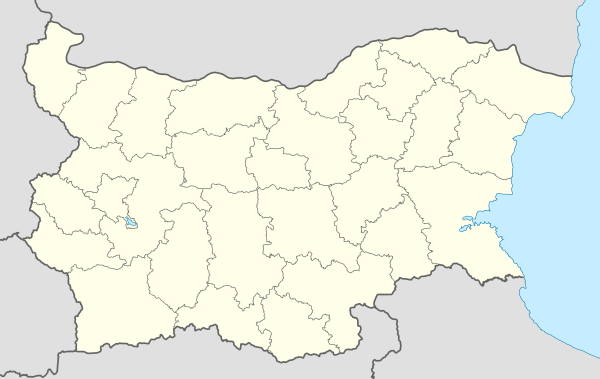Musomishta
Musomishta is a village in Gotse Delchev Municipality, in Blagoevgrad Province, Bulgaria. It is situated in the valley of Gotse Delchev, just 2 kilometers south-southeast of the town of Gotse Delchev and 75 kilometers southeast of Blagoevgrad.
Musomishta Мусомища | |
|---|---|
Village | |
 Musomishta | |
| Coordinates: 41°33′N 23°45′E | |
| Country | |
| Province | Blagoevgrad Province |
| Municipality | Gotse Delchev |
| Government | |
| • Mayor | Todor Libyahovski (Ind.) |
| Area | |
| • Total | 32.861 km2 (12.688 sq mi) |
| Elevation | 513 m (1,683 ft) |
| Population (15-03-2012 [1]) | |
| • Total | 2,285 |
| GRAO | |
| Time zone | UTC+2 (EET) |
| • Summer (DST) | UTC+3 (EEST) |
| Postal Code | 2920 |
| Area code(s) | 0751 |
History
The village is mentioned for first time in 1478 in the Ottoman documents as a village with 158 non-Muslim households and 5 Turk-Muslim households.[2] In 1873 year in the village were counted 93 households with 50 male Muslims and 260 male Bulgarians.[3] In 1900 year Vasil Kanchov describes Musomishta as a village with 523 Bulgarians and 100 Turks.[4] In 1909 in the village were counted 90 Bulgarian households with 450 people and 90 Turkish households with 468 people.[5]
Since the end of 1912 year the village became part of Bulgaria and the Turkish families fled from the village.
Economy
The light industry and the agriculture and stock farming are the most important sources of income in the village. There are clothing and textile, wood processing and furniture making, stone and marble processing and food producing workshops. Several shops for industrial goods and grocery stores are opened in the village. Many people go to work to Goyse Delchev.
Institutions
The village is governed by a Mayor and as part of the Gotse Delchev Municipality by the Municipal Mayor. There is post office in Musomishta, providing all the postal services.
Education and health-care
A kindergarten with a nursery "Prolet" takes care for the children from 0 to 6 years. The primary school "Hristo Botev" is teaching the pupils from 1st to 8th grade. There is a community center with a public library "Nokola Yonkov Vaptsarov". The health care is provided by a general practitioner and a dentist.
Religion
The vast majority of the population are Orthodox Christians. The church in the village is named after St Nicolas of Bari. There is another small church in the end of the village "St George".
References
- Радушев, Евгени (1998). "Демографски и етнорелигиозни процеси в Западните Родопи през XV-XVIII век (Опит за преосмисляне на устойчиви историографски модели)". Историческо бъдеще. 1: 74. ISSN 1311-0144.
- „Македония и Одринско. Статистика на населението от 1873 г.“ Македонски научен институт, София, 1995, стр. 128 - 129.
- Васил Кънчов. „Македония. Етнография и статистика“. София, 1900, с. 194
- Извори за българската етнография, Т.3, Етнография на Македония, Съставители: Маргарита Василева и Колектив, София, 1998, с.80